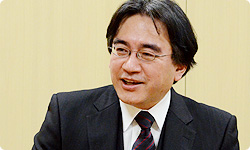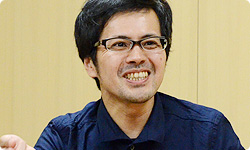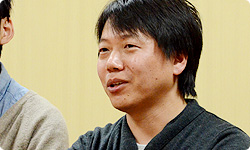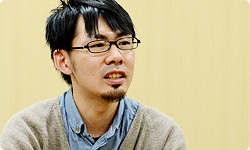Miyamoto-san really persevered with Paper Mario this time. What exactly was he particular about?
Aside from wanting us to change the atmosphere a lot, there were two main things that Miyamoto-san said from the start of the project: “It’s fine without a story, so do we really need one?” and “As much as possible, complete it with only characters from the Super Mario world”.
That’s a difficult task. In some ways that would be the exact opposite in terms of direction from recent games in the series.
Yes. With regards to the story, we did a survey regarding Super Paper Mario24 in Club Nintendo25, and not even one per cent said the story was interesting. A lot of people said that the Flip26 move for switching between the 3D and 2D dimensions was fun though.24. Super Paper Mario: An action-adventure game released for Wii in April 2007.25. Club Nintendo: A free, members-only points service run by Nintendo. It began in Japan in 2003 and 2006 in Europe. When members purchase certain software or game systems, register the serial number on the Internet and respond to post-game surveys, they earn points. These points can be exchanged for special items that are available for purchase.26. Flip: A move in Super Paper Mario that can be used to switch between a 2D and 3D viewpoint with a single button, altering how the game plays.
The project came together because of that idea. Kudo-san, you were in charge of the script, so what were your thoughts on whether a story was really necessary or not?

I originally saw it in a way that’s similar to Miyamoto-san. Personally I think all we need is to have an objective to win the boss battle at the end of the game. I didn’t think we necessarily needed a lengthy story as with traditional RPGs. Instead, we looked at the characteristics of a portable game that can be played little by little in small pieces and packed in lots of little episodes and ideas. I‘ve always liked putting in little ideas, so I actually enjoyed it.
It was just what Kudo-san wanted!
Yes.
When it comes to characters, in the session of Iwata Asks covering Super Mario Galaxy Miyamoto-san said that he was finally able to put the essence of Mario into words for the first time.
Yes, he did.
He says that a Mario-like design follows from function, so when something else comes into the mix, it doesn’t feel right.
You understand the character from its design – like if it has spikes, stepping on it will hurt.
When people vaguely sense something like that and can use logic to explain it, they want to share it. So talking about a Mario-like design might have been a big deal to Miyamoto-san at the time! (laughs)
But being unable to use new characters is pretty strict. Of course, we couldn’t not make any new enemy characters and as for allies among the Super Mario characters, there’s really only Toad in various colours!
But personally, the more restrictions there were, the more excited I got. They may look the same, but we put in some elements in which their personalities are slightly different, so you can tell the difference and you think, “Hey! Are you that Toad from back then?” Towards the end of development, I could feel that I became one with Toad! (laughs)
You can’t forget them, like when they have a bad personality, even though their faces are the same!
(laughs)
In addition to red, there are blue, yellow and green Toads. However, we held all but the red one in reserve, so we had to think carefully about when to use them. When we decided to put the ranger27 in the forest, there was a weird vibe, like, “Green Toad… you’re up!” (laughs)27. Ranger: Someone who protects the forest, as in a Park Ranger.

Creatively, restraints aren’t necessarily a bad thing. A lot of new attractive features come out of that.
That’s right. At first, we created a lot of individual allies as you’d find in a regular RPG, but when we decided to focus on stickers, in order to make a clear distinction to previous games in the series, we started all over again by throwing out the system, – including the characters – that we had made up to that point.
You purposely threw out the basic RPG structure?
Yes. We decided to make it so that players would face stronger opponents by throwing out the whole concept of experience points and levels in favour of gradually gathering stronger stickers. I had actually been thinking for a long time that I wanted to get rid of the RPG experience points. In Freshly-Picked Tingle's Rosy Rupeeland28, which Kudo-san and I worked on together, the player-character relationship didn’t develop at all. We adopted a system whereby they solved everything with money. This time, we decided to do everything with stickers. We decided on a system whereby in battle, instead of attack commands, you fight by using the stickers you have gathered in the field or bought in town . 28. Freshly-Picked Tingle’s Rosy Rupeeland: An RPG released for the Nintendo DS system in September 2006 in Japan and September 2007 in Europe.
That’s why we call it a “sticker battle adventure.”
Right. The stickers have all kinds of offensive abilities, so sometimes you can easily win by using the right stickers against the right enemies… you just have to find the right combination.
I see.
In addition, when it came to players creating their own stickers, we were fortunate to be able to use a program that a different group within IS was experimenting with. Like Kettle and Cat o’ Luck.
Kettle and Cat o’ Luck?
IS was experimenting with a program on Wii for throwing a 3D object at a wall, then having it stick and turn into a picture, so they let us use it. If you take a 3D ‘thing’ that you find in the courses and throw it at a certain wall, you can make a ’thing sticker’ . But at first the team was really against it.
Why was that?
We made the 3D ‘things’ look like real objects. Tanabe-san was constantly saying, “That oddness is great!”, but we didn’t know how to handle it and didn’t understand it at all at first. Normally, real objects like the Kettle or Cat o’ Luck wouldn’t fit into the Super Mario world.

That’s serious. (laughs)
But I had a hunch that the unsuitability of a real kettle would serve as a hook. If you took things that already looked like they belonged in the Super Mario world and turned them into stickers, there wouldn’t be much of a change, right? I showed that to Miyamoto-san, and he was like, “I guess that’s all right.” (laughs)
(laughs) But after all the criticism you’d taken, you must have been hesitant.
Yes. What at first was incomprehensible – like, “Why a kettle?” – is now thought of as “This is it!” (laughs)
When it came to checking the game world, the hurdle was really high for the Character Design Group.29 The tower murals in the desert, for instance… well, maybe Igata-san should tell you about those.29. Character Design Group: Part of the Software Development & Design Department of the Software Planning & Development Division at Nintendo. It produces and supervises Nintendo characters.
Yes. Let’s see… World 2 features a tower in a desert and in order to make an impression of ancient ruins, we discussed the idea of putting in a mural . To make it look more realistic though, we drew Toad and Koopa Troopas to appear taller than usual.

There’s a human–like Koopa Troopa with long arms and legs that moves around on all fours. It’s really creepy!
When I had that checked, they said it was “gross” and we thought, “Yes!”
At first, we took that as praise, but unfortunately, they meant exactly what they said!
(laughs)
After that, we put forth all kinds of designs but the more Super Mario-like they became, the less it seemed ancient and if we got realistic, it turned out to be something totally different.
When they were realistic, those Koopa Troopas just looked like shiitake mushrooms!
Yes! (laughs) In the end, while we made various designs, we showed the original design to Miyamoto-san and he was happy, saying, “Why don’t you make it even more disgusting?” So in the end, the original design was okay.
That was surprising. We thought, “You never know until you show Miyamoto-san!” And so we proceeded along like that.
I suppose that’s true. (laughs) But it seems like a part of you enjoys putting something edgy out there and seeing how much you can get away with.
No, there were times when Miyamoto-san really got angry at me! (laughs) For instance, with the treatment of Bowser. But the Super Mario games have an orthodox lineage that Miyamoto-san thought up as its creator. So while Paper Mario, as part of that, must preserve certain things, I think it’s nice to also tackle new and unusual things.
© 2024 Nintendo.